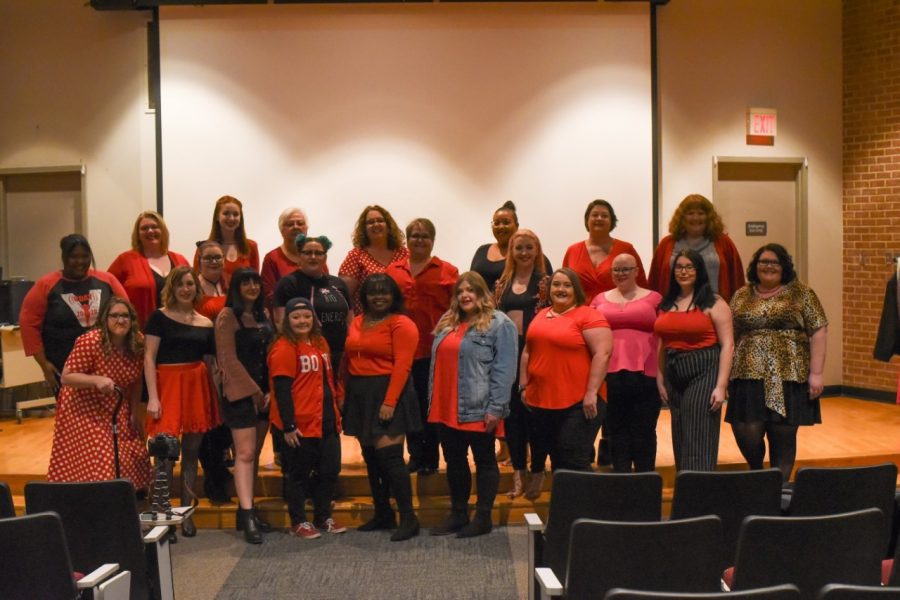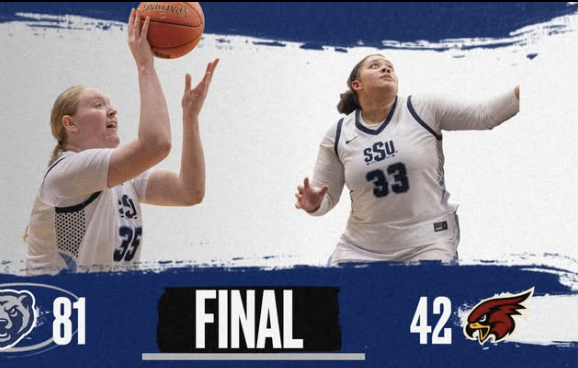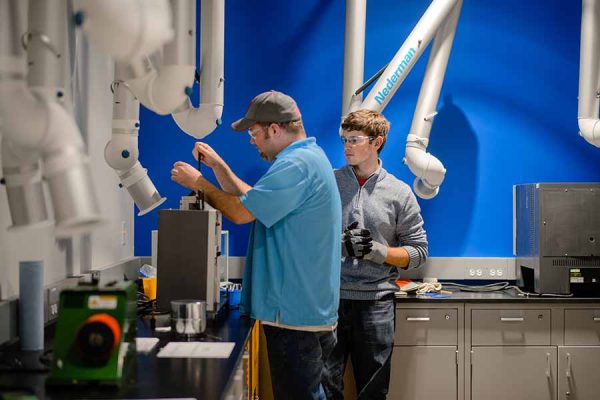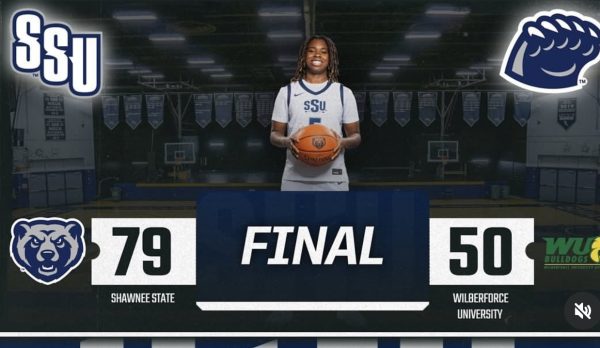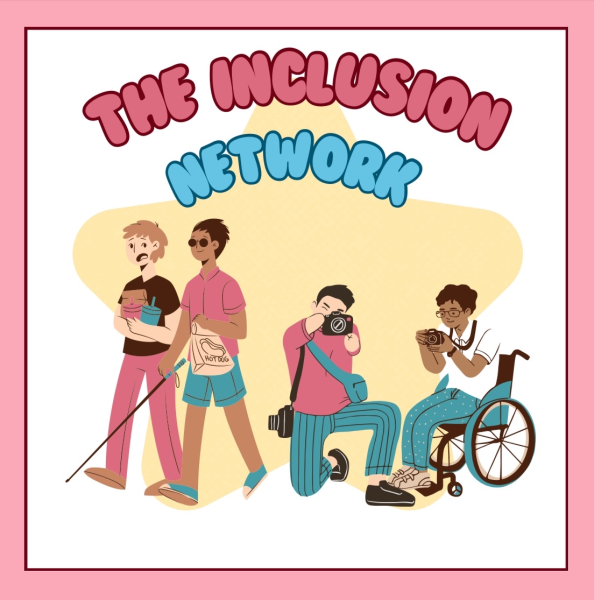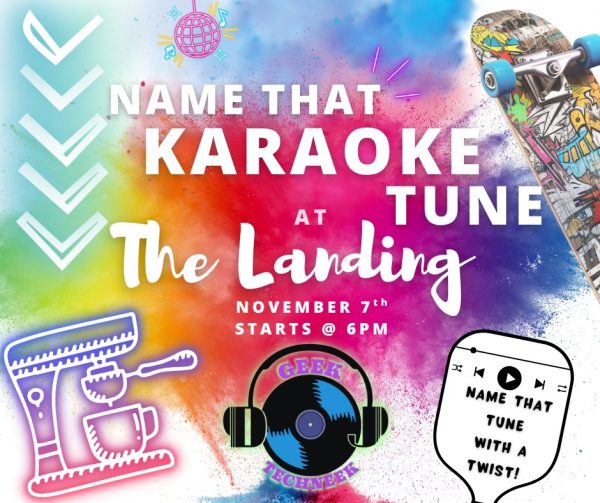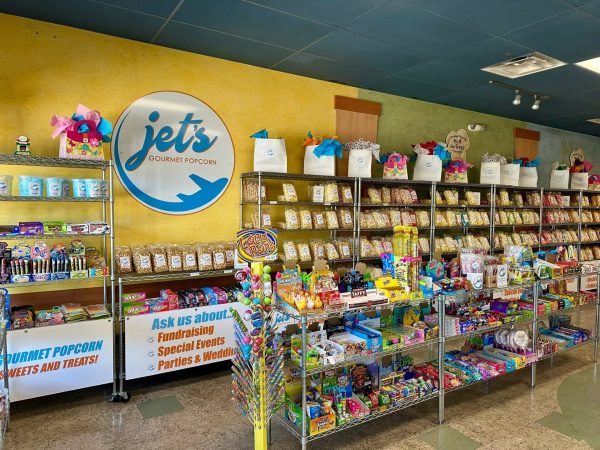“The Vagina Monologues”
Two Nights, Nineteen Stories
A photo of all of the students and staff who participated in “The Vagina Monologues.”
On Friday, Feb. 21, and Saturday, Feb. 22, the SSU Women’s and Gender Equity Center hosted their annual performance of “The Vagina Monologues” in the Flohr Lecture Hall. Students and staff performed a total of nineteen monologues about topics related to women, topics including politics, healthcare, social issues or just for fun. All proceeds from the performances and merchandise sales went to a domestic violence charity.
“The Vagina Monologues” was originally an off-Broadway episodic play written by Eve Ensler in 1996. Ensler conducted over 200 interviews with women about their vaginas, which led to the creation of the monologues. Since its premiere, it’s been revised several times with monologues added yearly about women’s topics that were important after the play’s first run as well as introducing the V-Day movement, which fights violence against women. SSU’s production included fifteen monologues from the collection, while four were original work from participants.
The production opened with an original monologue called Rise, performed by Kat Barcomb. Rise welcomed everyone, while Barcomb referred to women as her “sisters,” and repeated “I am here for the woman.” The monologue continued by encouraging women to break expectations and “be real.” At the end of Rise, the rest of the cast joined Barcomb onstage. While they stood together, they took turns talking about the discomfort associated with the vagina and conversation surrounding it. The script bounced from person to person, while they explained the premise of the original play and listed the numerous ways that people referred to the vagina.
One of the most notable monologues was Caroline Lakatos’s powerful performance of “Under the Burqua,” which was added to the play by Ensler in 2003. The performer of the previous monologue, Marlita Cadogan, ended her onstage time by turning out all of the lights in the room. The only visible source of light was the one held by Lakatos. She spoke of the experience some women faced under Taliban rule, telling audience members to imagine things such as being trampled while their husband was attacked in front of their screaming children. She continued and explained the feeling of being trapped inside the burqua, with lines like “imagine you went mad, but you did not know you were mad, because you were living under a bedspread.”
The second act housed the other three original works. One of them was a call-and-answer dialogue performed by Mackenzie Fox and Mackenzie Davis titled “Why I Didn’t Report.” This dialogue told the tale of a survivor of sexual assault and why they felt it didn’t need reported. Fox represented the survivor, while Davis represented the voice of reason that validated the survivor’s experience and reminded them that they have worth.
The final original work of the night, Glenna Heckler-Todt’s “My Vagina Has Betrayed Me,” told the story and struggle of a woman dealing with parimenopause through humor. “Is it hot in here or is it just me?” was one line that resulted in a hearty laugh from the audience. Heckler-Todt used her shawl to represent the mood of her message, and humorously used it to express the hot flashes that come with perimenopause. To finish the monologue, Heckler-Todt named some women who were notable post menopause, including another cast member, Becky Thiel, Grandma Moses and Helen Mirren.
The most notable monologue from the second half of Ensler’s production, however, was “The Woman Who Loved to Make Vaginas Happy,” also performed by Kat Barcomb. This monologue told the story of a lawyer that found her life’s calling in the sex industry, servicing women. The monologue’s end resulted in gratuitous laughter, as other cast members joined Barcomb on stage to comedically demonstrate the different kinds of moans.
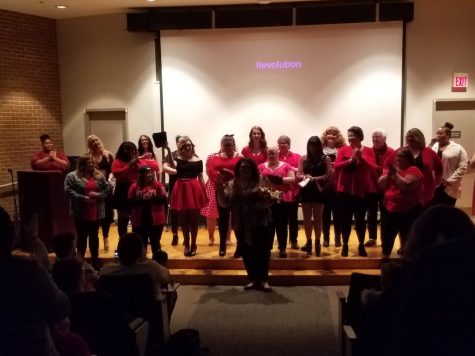
After all nineteen monologues, the cast took their bows and presented director Christina Baker-Jones with a bouquet
The night ended with an empowering and uplifting performance by the entire cast, called “Revolution.” Cast members made their way to the stage while contributing their own words to the topic of “my revolution is.” Once the entire cast was onstage, they encouraged the audience to do one thing. “Go ahead, love.” The director, Christina Baker-Jones, met the cast onstage and was presented with a bouquet of flowers as well as cheers and applause.
Each cast member had their own reasons for participating in The Vagina Monologues. One staff cast member, Glenna Heckler-Todt, said she felt that “it is important to do something, like performing, that takes you out of your comfort zone.” She also shared her thoughts on her original monologue, “my monologue was deeply personal and I felt I had something to say to women my age. [It] also made it more scary, saying my own words and sharing my own experience, [but] it also made it even more rewarding.”
Megan Shaffer, a student cast member, said she was motivated because she believes that “The Vagina Monologues” is “the most empowering experience that women on campus can have.” She shared that the cast felt like a sisterhood, one that shared common ideals and goals. “I love bringing life to other’ stories and giving women a voice. . . The monologues are a great way to have an impact and empower our tiny slice of the world.”
This is the second year in a row that “The Vagina Monologues” has been performed on campus after being on hiatus for several years. Director Christina Baker-Jones shared with the audience before the performance that she was “very excited to have it back.”
All-in-all, “The Vagina Monologues” shared the comedic highs and heartbreaking lows of what womanhood can be. Whether it was an empowering story of a woman who is inspired to stay relevant and important after menopause or the suffocating experience of a woman living meekly under Taliban rule, their stories were heard and awareness of their plights was spread. The lows were tear-jerking, the highs were laugh-inducing, and empowerment was shared between cast and audience alike.
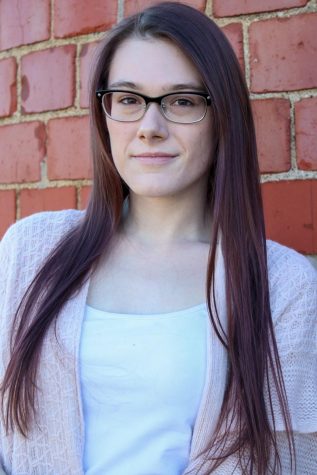
Anissa Peoples is a fifth-year senior studying English-Communication with a minor in fine arts game design. A seasoned writer, she has written for the...
